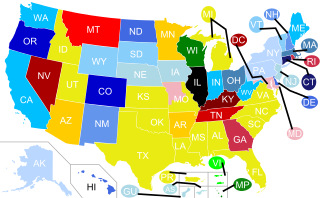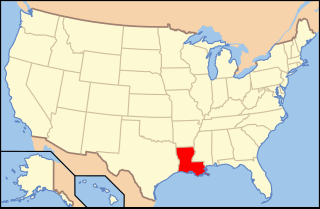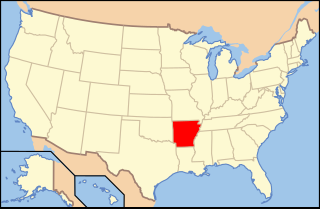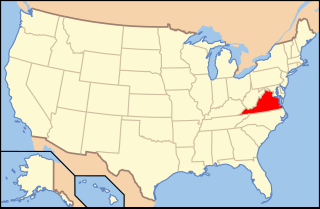A felony is traditionally considered a crime of high seriousness, whereas a misdemeanor is regarded as less serious. The term "felony" originated from English common law to describe an offense that resulted in the confiscation of a convicted person's land and goods, to which additional punishments including capital punishment could be added; other crimes were called misdemeanors. Following conviction of a felony in a court of law, a person may be described as a felon or a convicted felon.

Sodomy laws in the United States, which outlawed a variety of sexual acts, were inherited from colonial laws in the 17th century. While they often targeted sexual acts between persons of the same sex, many statutes employed definitions broad enough to outlaw certain sexual acts between persons of different sexes, in some cases even including acts between married persons.
In American constitutional law, a statute is void for vagueness and unenforceable if it is too vague for the average citizen to understand. This is because constitutionally permissible activity may not be chilled because of a statute's vagueness. There are several reasons a statute may be considered vague; in general, a statute might be void for vagueness when an average citizen cannot generally determine what persons are regulated, what conduct is prohibited, or what punishment may be imposed. For example, criminal laws which do not state explicitly and definitely what conduct is punishable are void for vagueness. A statute is also void for vagueness if a legislature's delegation of authority to judges or administrators is so extensive that it could lead to arbitrary prosecutions. A law can also be "void for vagueness" if it imposes on First Amendment freedom of speech, assembly, or religion.
The crime against nature or unnatural act has historically been a legal term in English-speaking states identifying forms of sexual behavior not considered natural or decent and are legally punishable offenses. Sexual practices that have historically been considered to be "crimes against nature" include masturbation, sodomy and bestiality.

Jessica's Law is the informal name given to a 2005 Florida law, as well as laws in several other states, designed to protect potential victims and reduce a sexual offender's ability to re-offend. A version of Jessica's Law, known as the Jessica Lunsford Act, was introduced at the federal level in 2005 but was never enacted into law by Congress.
John Webb was an American jurist who served as an associate justice of the North Carolina Supreme Court (1986–1998). Prior to serving on North Carolina's highest court, Justice Webb had been a Superior Court (trial) judge and a judge of the North Carolina Court of Appeals.
The term aggravated felony was used in the United States immigration law to refer to a broad category of criminal offenses that carry certain severe consequences for aliens seeking asylum, legal permanent resident status, citizenship, or avoidance of deportation proceedings. Anyone convicted of an aggravated felony and removed from the United States "must remain outside of the United States for twenty consecutive years from the deportation date before he or she is eligible to re-enter the United States." The supreme court ruled 5-4 in Sessions v. Dimaya that the residual clause was unconstitutionally vague limiting the term.
Rose v. Locke, 423 U.S. 48 (1975), was a United States Supreme Court case in which a Tennessee statute proscribing "crime against nature" was held not unconstitutionally vague as applied to cunnilingus, satisfying as it does the due process standard of giving sufficient warning that men may so conduct themselves as to avoid that which is forbidden. Viewed against that standard, the challenged statutory phrase is no vaguer than many other terms describing criminal offenses at common law, which are now codified in criminal codes. Moreover, the Tennessee Supreme Court by previously rejecting claims that the statute was to be narrowly applied has given sufficiently clear notice that it would be held applicable to acts such as those involved here when such a case as this arose.

National Coalition for Gay and Lesbian Equality and Another v Minister of Justice and Others is a decision of the Constitutional Court of South Africa which struck down the laws prohibiting consensual sexual activities between men. Basing its decision on the Bill of Rights in the Constitution – and in particular its explicit prohibition of discrimination based on sexual orientation – the court unanimously ruled that the crime of sodomy, as well as various other related provisions of the criminal law, were unconstitutional and therefore invalid.

A sodomy law is a law that defines certain sexual acts as crimes. The precise sexual acts meant by the term sodomy are rarely spelled out in the law, but are typically understood by courts to include any sexual act deemed to be "unnatural" or "immoral". Sodomy typically includes anal sex, oral sex, and bestiality. In practice, sodomy laws have rarely been enforced against heterosexual couples, and have mostly been used to target homosexual couples.

In the United States, each state and territory sets the age of consent either by statute or the common law applies, and there are several federal statutes related to protecting minors from sexual predators. Depending on the jurisdiction, the legal age of consent is between 16 and 18. In some places, civil and criminal laws within the same state conflict with each other.

Lesbian, gay, bisexual, and transgender (LGBT) persons in the U.S. state of Louisiana may face some legal challenges not experienced by non-LGBT residents. Same-sex sexual activity is legal in Louisiana, and same-sex marriage has been recognized in the state since June 2015 as a result of the Supreme Court's decision in Obergefell v. Hodges.

Lesbian, gay, bisexual, and transgender (LGBT) persons in the U.S. state of Massachusetts enjoy the same rights as non-LGBT people. The U.S. state of Massachusetts is one of the most LGBT-friendly states in the country. In 2004, it became the first U.S. state to grant marriage licenses to same-sex couples after the decision in Goodridge v. Department of Public Health, and the sixth jurisdiction worldwide, after the Netherlands, Belgium, Ontario, British Columbia, and Quebec.

Lesbian, gay, bisexual, and transgender (LGBT) persons in the U.S. state of Arkansas may face some legal challenges not experienced by non-LGBT residents. Same-sex sexual activity is legal in Arkansas. Same-sex marriage became briefly legal through a court ruling on May 9, 2014, subject to court stays and appeals. In June 2015, the U.S. Supreme Court ruled in Obergefell v. Hodges that laws banning same-sex marriage are unconstitutional, legalizing same-sex marriage in the United States nationwide including in Arkansas. Nonetheless, discrimination on the basis of sexual orientation and gender identity was not banned in Arkansas until the Supreme Court banned it nationwide in Bostock v. Clayton County, Georgia in 2020.

Lesbian, gay, bisexual, and transgender (LGBT) persons in the United States state of Virginia enjoy the same rights as non-LGBT persons. LGBT rights in the state are a recent occurrence, with most improvements in LGBT rights occurring in the 2000s and 2010s. Same-sex marriage has been legal in Virginia since October 6, 2014, when the U.S. Supreme Court refused to consider an appeal in the case of Bostic v. Rainey. Effective since July 1, 2020, there is a statewide law protecting LGBT persons from discrimination in employment, housing, public accommodations, and credit. The state's hate crime laws effective since July 1, 2020, now explicitly include both sexual orientation and gender identity.

Lesbian, gay, bisexual, and transgender (LGBT) persons in the U.S. commonwealth of Kentucky still face some legal challenges not experienced by other people. Same-sex sexual activity is legal in Kentucky. Same-sex couples and families headed by same-sex couples are not eligible for all of the protections available to opposite-sex married couples. On February 12, 2014, a federal judge ruled that the state must recognize same-sex marriages from other jurisdictions, but the ruling was put on hold pending review by the Sixth Circuit. Same sex-marriage is now legal in the state under the U.S. Supreme Court ruling in Obergefell v. Hodges. The decision, which struck down Kentucky's statutory and constitutional bans on same-sex marriages, and all other same sex marriage bans elsewhere in the country, was handed down on June 26, 2015.
This article concerns LGBT history in Florida.

State v. Whitmarsh was a South Dakota Supreme Court case decided on November 18, 1910, which asked whether or not fellatio, or oral sex, should be classified as sodomy. The contemporary federal common law definition of sodomy did not include fellatio. The court ruled that fellatio was an "abominable and disgusting" crime against nature and outlawed it between any two persons, regardless of marital status, sexual orientation or age. The case set a precedent for other states' laws and remained in effect in South Dakota for the next 66 years, until all sodomy laws, including the "crime against nature" statute, were abolished by the South Dakota Legislature in 1976.
Rape laws vary across the United States jurisdictions. However, rape is federally defined for statistical purposes as:
Penetration, no matter how slight, of the vagina or anus with any body part or object, or oral penetration by a sex organ of another person, without the consent of the victim.











